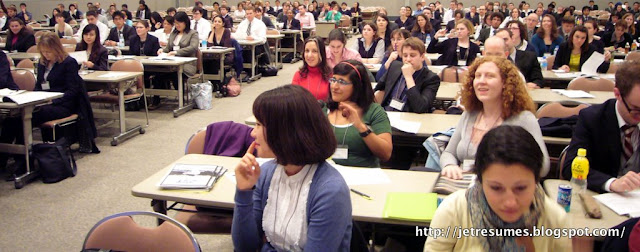Hi AJC participants:
I had a great time presenting resume, CV, cover letter, and interview tips on Mon, 25 Feb.
You asked excellent, insightful questions and kept me on my toes. I love this event!
As promised, I plan to produce a new video to help you prepare for interviews.
A. Write these 11 core interview questions on note cards
B. Write keywords or bullet points on the back of each card
C. Assemble the cards in random order (different every time)
D. Start the timer as you begin speaking
E. Ask and answer each question
F. Maintain eye contact (with yourself) as you talk (try not to look at your cards)
G. Ask yourself "why" and "how" whenever appropriate to simulate an interviewer's follow-up questions
H. Make each answer as direct and concise as possible
I. Listen to your answers in between self-study practice sessions to ensure continuous quality improvement
-Updated by Vince on 25 Feb 2013
For now, I am pasting my "mirror method" tips, as mentioned in the presentation.
Please subscribe to my YouTube channel for the latest video updates.
Most of all, please enjoy the rest of the AJC and your JET experience!
Cheers,
Vince
Use Vince's "Mirror Method" to practice your interview answers at home
-
Interviewing is physical
-
Do not prepare for interviews by writing outlines or scripts, or, worst of all, creating PowerPoint slides
-
Instead, talk ... to yourself
Background
-
Although I majored in History at Stanford, I took more acting classes than history classes
- Patricia Ryan Madson was my acting professor (check out her bestselling book)
-
She taught me how to use the mirror to prepare for challenging roles
-
I have modified her method to help you pass your MBA interviews
Supplies needed
- note cards
- a mirror
- a timer set for 30 minutes (typical interview length)
- a voice recorder (smart phone, computer, IC recorder: anything that will record your voice for playback and review)
Mirror Method Steps
1. SELF-INTRODUCTION: Tell me about yourself / Walk me through your resume.
2. STRENGTHS AND WEAKNESSES: What are your three greatest strengths and three greatest weaknesses?
4. TEAMWORK: What role do you usually play in teams?
5. DIFFICULT TEAM (behavioral question): Tell me about a time that you had to work on a team that did not get along. What happened? What role did you take? What was the result? Based on that example, what would you do if your MBA study team members were not getting along with each other?
6. FAILURE (behavioral question): Tell me about a time when you failed. What did you learn from the experience?
7. GOALS What are your goals?
8. WHY THIS COMPANY / WHY THIS SCHOOL?
9. POTENTIAL CONTRIBUTIONS: How will you contribute to our organization / school / community?
10. ONE LAST THING ABOUT YOU: Surprise me. Tell me something else you want me to know that is not covered in your application.
C. Assemble the cards in random order (different every time)
D. Start the timer as you begin speaking
E. Ask and answer each question
F. Maintain eye contact (with yourself) as you talk (try not to look at your cards)
G. Ask yourself "why" and "how" whenever appropriate to simulate an interviewer's follow-up questions
H. Make each answer as direct and concise as possible
I. Listen to your answers in between self-study practice sessions to ensure continuous quality improvement
REPEAT STEPS
EVERY MORNING AND EVERY NIGHT UNTIL YOUR ACTUAL INTERVIEW
-
Shuffle your question cards every time you practice
-
Make sure to ask yourself questions in a different order every time
-
Reason: human memory is built through repetition in random order
-
If you expect questoins to follow a certain logical order, you might be surprised and unprepared if the interviewer follows her own logic and asks the questions in a different order than you expected
-Updated by Vince on 25 Feb 2013
- Watch Vince videos on YouTube
- I invite you to follow me on Twitter at twitter.com/tokyovince and join me on Facebook.

No comments:
Post a Comment
Note: Only a member of this blog may post a comment.